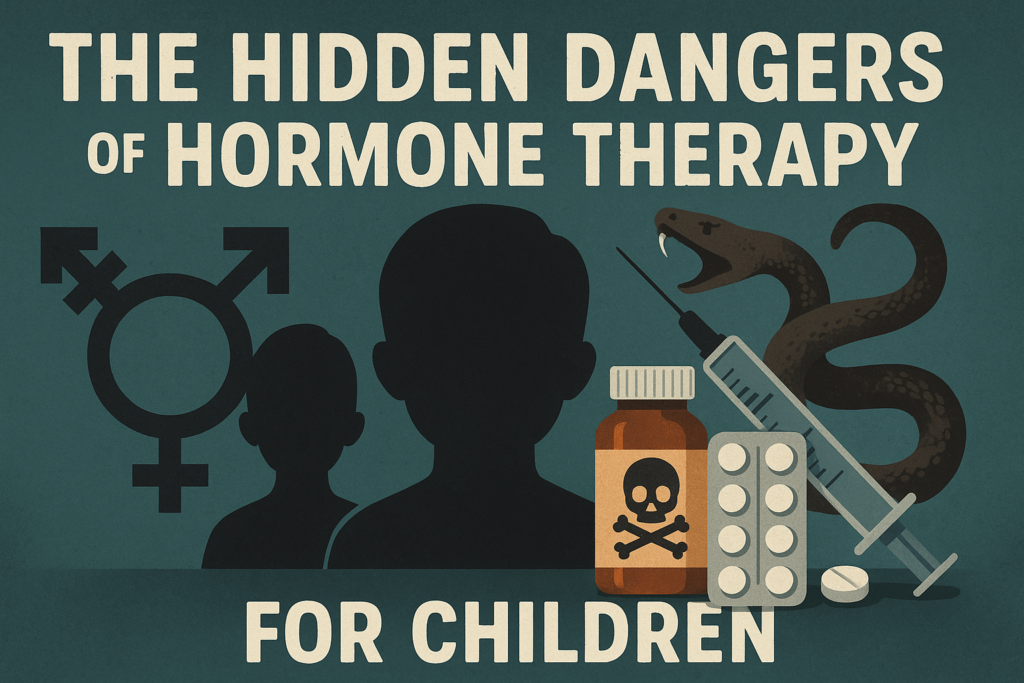
Hormone therapy for children to change their sex is a growing practice that raises serious medical and ethical questions. While adults can make decisions about their bodies with informed consent, giving children powerful hormone treatments before they reach physical and emotional maturity can cause irreversible harm. These treatments are often presented as a solution for gender dysphoria, but the consequences can be devastating. Both the physical and social risks must be considered.
Physical Harm from Hormone Use in Children
Hormone therapy to change a child’s sex typically includes puberty blockers, followed by cross-sex hormones like estrogen or testosterone. These drugs interrupt or alter the natural course of puberty. While advocates argue this gives children time to explore their identity, medical evidence shows it can seriously damage their development.
Disrupted Growth and Bone Development
Puberty blockers delay the production of sex hormones like testosterone and estrogen. These hormones are essential not only for sexual development but for bone density and growth. Blocking them during key developmental years can lead to weak bones, increasing the risk of osteoporosis and fractures. A child’s growth plates may close prematurely, permanently stunting height and skeletal development.
Infertility and Sexual Dysfunction
Cross-sex hormones often follow puberty blockers. For boys transitioning to girls, this means taking estrogen. For girls transitioning to boys, it means taking testosterone. These drugs can cause permanent infertility. Testicular or ovarian function can be destroyed, and in many cases, the effects cannot be reversed even if the child stops taking hormones. Additionally, many teens report reduced or absent sexual function later in life. Because their natural puberty was halted, their sexual organs never fully mature, leaving them with lifelong physical limitations.
Cardiovascular and Other Health Risks
Hormone treatments can increase the risk of blood clots, strokes, heart disease, and other serious conditions. Estrogen raises the risk of venous thromboembolism. Testosterone can affect cholesterol and blood pressure. Because these drugs are often given off-label and long-term studies are limited, many of the risks are not fully understood. However, existing data suggest significant health consequences.
Psychological Effects of Medicalization
While hormone therapy is often promoted as a treatment for psychological distress, it can have the opposite effect. Many teens who begin treatment believe it will solve their emotional struggles, but the underlying causes of their distress often remain. Once physical changes occur, some experience regret and worsening mental health. Detransitioners, people who return to their birth sex, often report feeling betrayed by doctors who did not adequately assess their needs before prescribing life-altering drugs.
Social Harm and Long-Term Consequences
The social impact of early hormone treatment can be just as serious as the physical harm. Children and teens are still forming their identities. Medicalizing gender exploration can lock them into a path they may later regret.
Peer and Family Pressure
Children are highly influenced by their environment. In some cases, they may feel pressure from peers, online communities, or even well-meaning adults to identify as transgender. What might begin as a temporary phase or a response to trauma can quickly become a permanent label once medical treatment begins. When adults affirm a child’s feelings without thorough evaluation, it can encourage the idea that medical intervention is the only answer.
Loss of Reproductive Autonomy
Decisions made in adolescence can have lifelong consequences. A 13-year-old who begins puberty blockers may not fully understand that they are giving up the possibility of having biological children. By the time they are old enough to want a family, it may be too late. This loss of reproductive autonomy is irreversible and has deep emotional consequences.
Stigma, Isolation, and Regret
Some children who undergo hormone treatment later feel alienated from both the transgender community and the one they left behind. Detransitioners often face stigma from those who once supported their transition and skepticism from those who never did. They may feel they were pushed into medical decisions too young and struggle with identity confusion, mental health issues, and deep regret.
The Need for Caution and Responsibility
The use of hormones to change a child’s sex is not a neutral act. It is a serious medical intervention with lifelong consequences. Children are not capable of fully understanding what these treatments will mean for their future. While compassion for children experiencing gender distress is important, the response should be careful, thoughtful, and grounded in science, not ideology.
There is a growing number of medical professionals, parents, and former patients calling for greater oversight and a more cautious approach. Until long-term studies confirm safety and effectiveness, hormone therapy for children should not be normalized or rushed. The stakes are too high to experiment on the bodies and futures of vulnerable young people.
